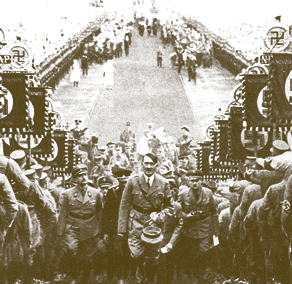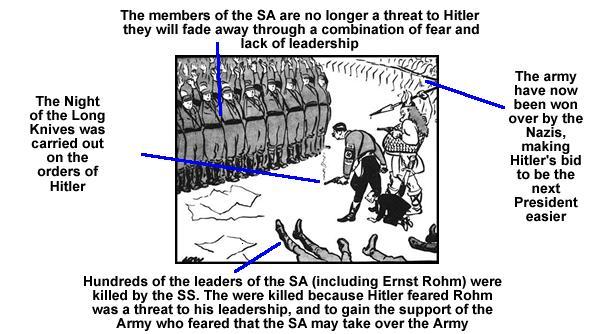........................

By the summer of 1933, the S.A. had grown discontented with the progress of the Nazi regime. Many had taken seriously the "socialism" of "National Socialism" (due to their years of unemployment), and were angry that Hitler and the other party leaders had not. As a result, they grew increasingly distant from the Nazi leadership and believed further steps needed to be taken to achieve substantive social and economic change. They also wanted to become the core of a new German army.
By 1934, Hitler dominated Germany's government, but still feared losing power in a coup d'�tat. To maintain complete control, he allowed political infighting to continue among his subordinates. As a result, a political struggle grew, with Hermann G�ring, Joseph Goebbels, Heinrich Himmler and Reinhard Heydrich on one side and Ernst R�hm, the leader of the S.A., on the other. The S.A. was the only remaining viable threat to Hitler's power.
The power of R�hm and his violent organization frightened his rivals. Goering and Himmler asked Heydrich to assemble a dossier of manufactured evidence to suggest that R�hm had been paid 12 million marks by France to overthrow Hitler. Himmler presented the "evidence" to Hitler, fuelling his suspicion that R�hm intended to use the S.A. to launch a plot against him ("R�hm-Putsch"). At the time, Himmler had nearly completed the restructuring of another Nazi organization, the SS (Schutzstaffel), from one tasked with protecting Nazi leaders into a secret police formation. The eventual marginalization of the SA removed an obstacle to Himmler's accumulation of power over the coming years.
Hitler had always liked R�hm � he was one of the first members of the Nazi Party, and had participated in the Beer Hall Putsch. But Hitler was under increasing pressure to reduce the S.A. influence. Hitler's industrialist supporters were concerned over the S.A.'s socialist leanings � socialism had been useful for the Nazi rise to power, but the ideology stood in contradiction to nationalist Nazi goals. Likewise, military leaders were alarmed by R�hm's proposal that the German army, which was limited by the Treaty of Versailles to 100,000 men, be absorbed into the larger S.A., which in early 1934 numbered 2.5 million. Some leaders of the Nazi party also joined in the dislike of many conservative officers expressed over the overt homosexuality of R�hm and some other S.A. leaders. The Night of the Long Knives was a significant prelude to life in Nazi Germany, and its use of terrorism to eliminate dissent �expanding later into the Holocaust...cont'd
http://en.wikipedia.org/wiki/Night_of_the_Long_Knives 